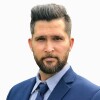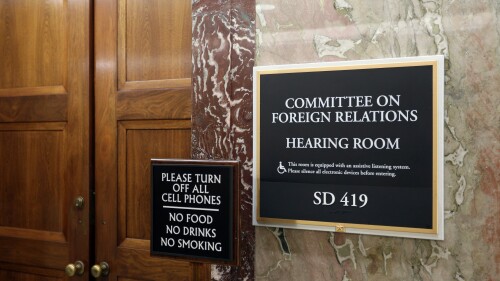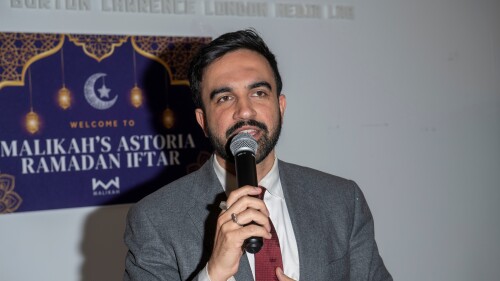The Middle East Forum has launched its Islamism in Politics (IIP) project to monitor and challenge Islamist political activity, and to promote moderate Muslim interests in its stead. The significance of that mandate was made clear this week, when Muslim politicians, activists, Imams, and scholars gathered in Washington D.C. to convene the inaugural “Muslim Collective for Equitable Democracy,” hosted by the 501(c)3 nonprofit Muslim Caucus Educational Collective.
Held on July 23-24, 2019, the conference made headlines after Rep. Ilhan Omar (D-Minnesota) denounced Muslims for Progressive Values (MPV) President Ani Zonneveld for asking a question about efforts to combat the illegal practice of Female Genital Mutilation (FGM). Omar called the question “appalling” and said she was “disgusted” that she should have to repeatedly condemn the procedure, which reportedly affects 99 percent of Somali women at trauma centers in the congresswoman’s own district.
“Even though Muslims are questioned constantly about things by non-Muslims with ill-Intent, the same should not be assumed for Muslims who are genuinely trying to advocate for issues of deep concern to our community,” Zonneveld later wrote in a public statement. “We are not the enemy.”
Nevertheless, the Muslim Collective was promoted in the press as a unifying event that would bring together a broad spectrum of political and religious views. Event organizers promised “to bring to light the many political and ideological differences between various American Muslim constituencies.”
However, critics contend that the conference was merely a platform for existing Islamist groups to organize with a new generation of Muslim politicians and activists. Reformist Muslims complain that they have been politically excluded in favor of a hardline Islamist minority which falsely claims to represent all Muslims.
These moderates and reformers, who reject Islamism and hold diverse political opinions, have been politically marginalized by Islamist-controlled Muslim institutions. Following the conference, several of these Muslim reformers have issued public statements warning of the unrepresentative nature of the Muslim Collective and the underlying Islamist agenda it served to advance:
Rabia Kazan, President, Middle Eastern Women’s Coalition, award-winning women’s rights activist, and author of The Angels of Tehran
The first annual “Muslim Collective for Equitable Democracy” conference promised to “highlight the broad spectrum of our community and the issues that impact us on a daily basis.” In reality, this event was designed to legitimize and empower a very specific political and religious worldview that is at odds with many Muslim Americans and Middle Eastern immigrants. These are the same Islamist actors and organizations that consistently claim to speak for Muslim and Middle Eastern communities in America, but in fact represent an extremist minority.
The issues that are central to the Middle Eastern Women’s Coalition — Sharia Law, child marriages, Christian persecution, genital mutilations, anti-Semitism, and honor killings — were intentionally disregarded by the conference participants. When asked to comment on just one of these issues, Rep. Ilhan Omar responded by calling the question “appalling” and scolded the attendee who dared to pose it.
A Muslim Caucus that fails to address some of the most salient needs of Muslim women cannot claim to be a “collective.” The Middle Eastern Women’s Coalition condemns this conference and its extremist participants.
M. Zuhdi Jasser, President, American Islamic Forum for Democracy and co-Founder of the Muslim Reform Movement and author of “A Battle for the Soul of Islam”
I see political activism in Washington and on my local level here through the lens of my American identity, infused by my personal morals, ethics, and values. Certainly, faith plays a role in that but never as a “collective” identity. That faith-based collectivization of any lobbying effort only serves to fuel Islamist movements which I see as our primary cancer in radicalizing our co-religionists.
Now, when the our government, media, or other faith communities, for example, seek input from American Muslim activists, that should be ideologically diverse across the spectrum of American Muslim ideological diversity. Thus, that should include Islamist and non-Islamist activists with equal seats at the table. This collective conference seems to be led predominantly — if not exclusively — by Islamists.
I reject the Islamist collectivist lobbying premise whether it is on the Right or the Left. When I lobby my representatives, my faith identity is of no consequence. And when I go to pray at the mosque, the political identity of those with whom I pray side-by-side should also be of no consequence.
In essence, I reject the entire premise of this Collective conference, and I find their effort to proclaim “Muslim power” to be offensive and antithetical to both my faith values and my Americanism.
This conference and its verbiage could have been lifted from the founding documents of the Muslim Brotherhood in Egypt, Jamaat-e-Islami in Pakistan, the Wahhabis in Saudi Arabia, and the Khomeinists of Iran.
Shireen Qudosi, National Correspondent, Clarion Project, Muslim Reformer
It’s alarming to see organized American Islamists continue to push into political engagement through the filter of religious identity. We are Americans first and foremost, and faith should always remain a private matter. This holds especially true for Congressional leaders like Ilhan Omar and Rashida Tlaib, who as elected leaders have a duty to represent their districts. Neither they, nor the individuals or organizations participating in the theatre that is the Muslim Caucus, are an honest representation of American Muslim voices.
In fact, these speakers and the Islamist-supremacist interests they represent go out of their way to crush minority and dissenting voices within the American Muslim community. This is a known fact in our communities. Events like Muslim Caucus Day offer a two-pronged strategy for Islamists. First, it presses into the public mind the monolithic view — the Islamist propaganda — of what it means to be Muslim. Second, the politicization of our faith churns future protest opportunities for Islamists when policies inevitably address Islam and Muslims.
Islamism is a parasite that needs Western democracy as its host. In America, they’ve found a willing host that through its own desperate need to be tolerant and inclusive, is willing to be depleted by entertaining crafted, well camouflaged extremists.
Soraya M. Deen, Founder of The Muslim Women Speakers, international activist, community organizer, and interfaith advocate
It is sad to see that we are dividing and building walls around us. We must be an American National Caucus. Any party based on religion, ethnicity and identity spells gloom and doom. A peek into history will reveal that such dangerous trends emboldens Islamists.
What’s next — American Islamic Caucus? The founders of this organization must focus on reform in the Muslim world. That might ensure democracy and an end to violent extremism that is rocking our world.
Benjamin Baird is the Islamism in Politics project coordinator at the The Middle Forum.







